‘Why take this kind of person out?’ Amid social stigma of autism, more retailers go for inclusivity
Most Singaporeans hardly need to think twice about going out for leisure, but for carers of people with autism, the thought of it can instil ‘dread’. Can retailers make it easier for them? Some are starting to do so now.
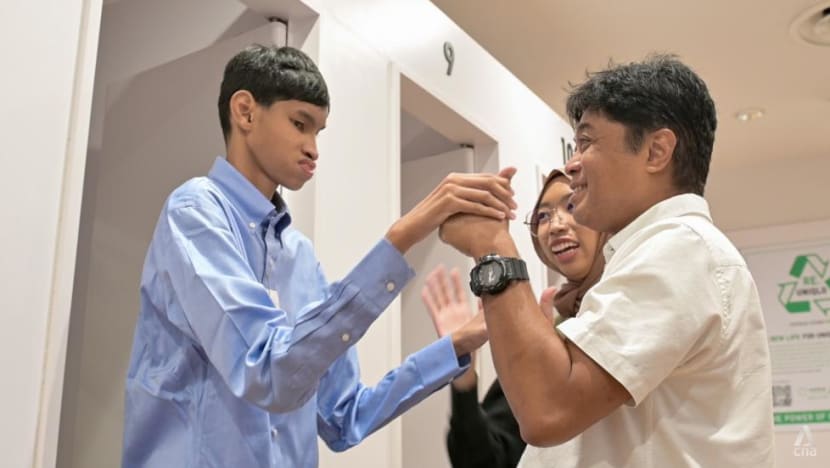
All smiles as Dzakir (left), who has global developmental delay, steps out of a fitting room for the first time. (Photo: Abel Khoo/CNA)
• Uniqlo’s 51 @ Ang Mo Kio outlet offers a private shopping service for those who require a calm environment.
• By next month, some shops in Frasers Property Singapore’s malls will roll out a “calm hour” twice weekly.
• Parents welcome these moves but wonder about the timings and lack of publicity.
• One expert calls for mandatory disability awareness training for companies; another says voluntary initiatives “work better”.
SINGAPORE: With their school graduation a week away, twins Amirizdzakir and Amirizdzakwan were choosing outfits for the ceremony.
As the teenagers stepped out of the fitting rooms in dress shirts they had picked, their father, Izwar Mohamed, broke into a smile.
“It’s really a milestone,” he said, referring not to their graduation but the event unfolding before his eyes. At age 18, his sons were trying on clothes in a shop for the first time.
The boys, who go by the names Dzakir and Dzakwan, have global developmental delay as well as traits associated with autism spectrum disorder.
Going out can be a stressful event for them and their family; the boys find crowded areas, with the cacophony of voices and music from shops, along with the bright lights and all sorts of smells, overstimulating.
On bad days, they could have a meltdown and crumple to the floor the moment they reach their destination, said their mother, Norhayati Johari.
But this time, the family got to visit Uniqlo’s 51 @ Ang Mo Kio outlet an hour before opening time for a private shopping session — at no extra charge — as part of a new initiative the fashion retailer launched last year. The lights were dimmed and the music turned off at the family’s request.
In recent times, more initiatives like this have come about to help make shopping a pleasanter experience for families with special needs.
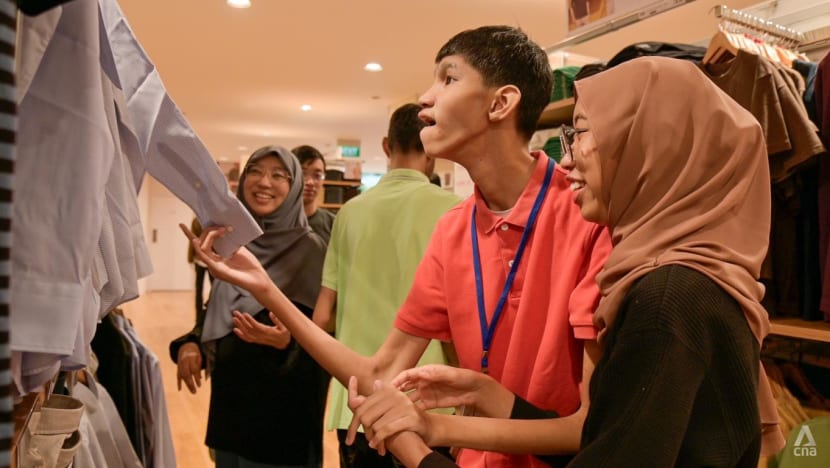
For example, by next month, 17 shops across six shopping centres — Causeway Point, Hougang Mall, Northpoint City, Tiong Bahru Plaza, Waterway Point and White Sands — run by Frasers Property Singapore will roll out “calm hour” in the first hour of operations once or twice a week.
During this hour, there will be dim lights, no music, no digital screens and no cleaning so that there will not be strong detergent smells or the sound of vacuum cleaners. Other shoppers can still visit at this time.
Brands that have come on board this Inclusion Champions programme include haircut service provider EC House and toy store Toys “R” Us.
Experts and parents of special needs children hail these moves as a good first step, but in practice, how far does it address their needs? And does it bring Singapore closer to being an autism-friendly society?
TIME AND SPACE ‘TO EXPLORE’
For the twins, the fact that Dzakwan made it to Uniqlo without throwing a fit was the first sign that their shopping trip might turn out fine. Of the two, he is more sensitive to noise and unfamiliar places.
With the shop’s music turned off, both boys appeared comfortable, Norhayati told the staff on duty. Otherwise, Dzakir would be pulling her along to get to the source of the music.
And whereas she would normally feel “pressure” to make sure they do not affect other customers, Dzakir and Dzakwan could now dart across the aisles and touch whatever they wanted to satisfy their curiosity.
That helps to calm them, especially in a new environment, said their sister, Nur Laiyinah Najihah Noor Izwar, 22.
“I was a bit afraid just now because Dzakwan was getting a bit agitated. But because he had some time for himself and the opportunity to explore a bit, that let him calm down on his own,” she said.
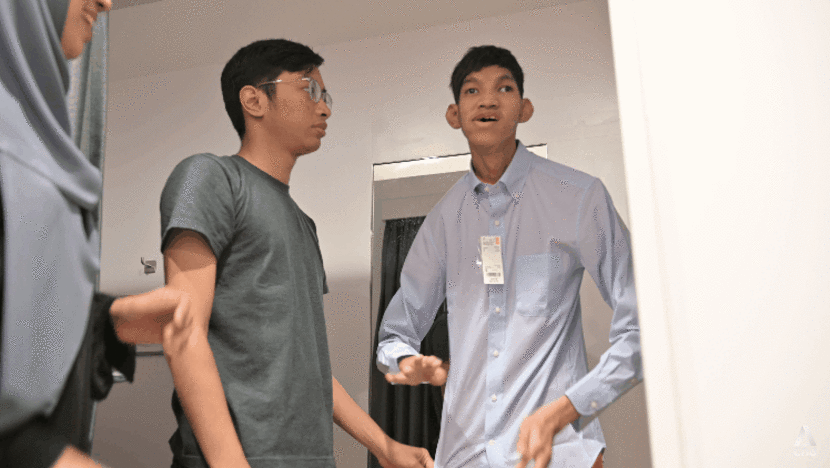
Izwar, 56, was also pleasantly surprised to discover the twins had their own fashion sense: Between plaid and plain, Dzakwan pointed to the latter.
Usually, Norhayati buys clothes for them. Here, “at least they get to make their own choice”, said the 52-year-old.
The boys themselves, who are non-verbal, appeared to enjoy their time out. “You don’t really see it in the facial features but from their movements, their body language. They’re very proud (of themselves),” said Izwar.
While it would be helpful if more Uniqlo outlets were to offer this private shopping service, said Izwar, his family are happy to drive from their home in Pasir Ris to Ang Mo Kio.
After all, they have even gone to a specific — and very patient — hairdresser in Johor Bahru for the boys to receive haircuts.
“When we actually go to some stores, it’s a touch-and-go kind of thing,” said Norhayati. “We don’t really have very high expectations because we come from literally zero (experience), so this is so good for us.
“At least I know that I have a place (where) I don’t have to worry (about whether the twins are) like this or like that. Don’t have to prepare so much; just come.”
PRACTICAL CONCERNS REMAIN
The usual time allocated for Uniqlo’s private sessions is on Thursdays before the shop opens at 11 a.m. Similarly, Frasers Property’s calm hour is on Monday and Tuesday mornings.
But mother-of-three Christine, who asked to go by her first name, questioned whether these weekday timings were feasible for working parents like herself. Her second child, 4, has special needs.
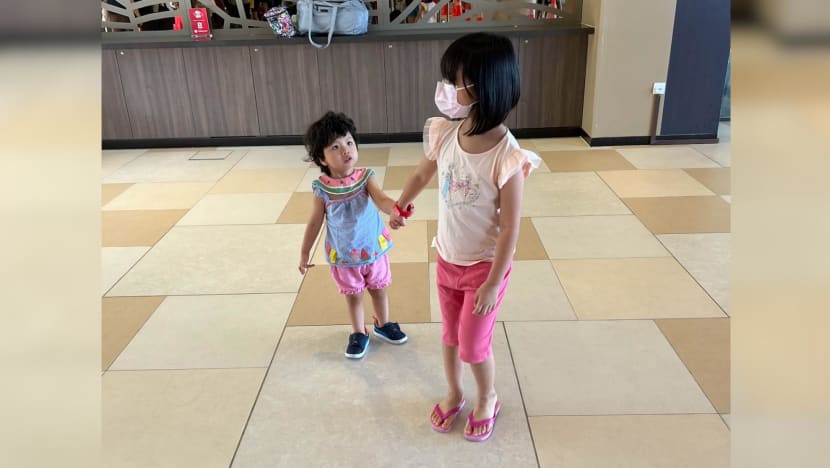
EC House said it chose the first hour of operation as traffic is usually lower, which would allow the company to “approach the event with greater confidence”.
In future, EC House may consider extending the duration of the calm hour or hosting it more frequently than once a week, after “observing its effectiveness and assessing any potential operational conflicts”.
“If everything proceeds smoothly, we’ll consider expanding this event to other EC House outlets throughout Singapore,” said a spokesperson.
Likewise, Uniqlo Singapore chief executive officer Yuki Yamada said its current initiative, called Uniqlo Access, is “a starting point”, and the retailer will consider expanding the service to include weekends. It also hopes to expand the service to new and existing outlets in Singapore.
“It’d be great for us to receive more feedback, positive or negative, then we’ll see … how we can adjust our business,” he said. “That’s the way we can go to the next stage.”
WATCH: We try Uniqlo’s private shopping services, for customers with special needs (12:55)
While a quiet hour may be helpful for some, parent Rajendran K Sethuraj, 57, pointed out that those on the autism spectrum have diverse needs. His son, for example, has moderate autism and can be all right in loud places but is triggered by a faint smell of bananas.
This is more important to Rajendran: staff who are ready to render support when things go south.
“When there’s a meltdown, (we’re) just focusing (on our child),” he said. If the staff could direct them to the nearest quiet area in the shop or the shopping centre or just ask how they could help, he would find that “very helpful”.
He also hopes these support services can be made more visible, whether with a uniform or a tag the staff can wear or signs showing which shop is autism-friendly.
“(The shopping centre) is very huge, right? If you say, ‘we’re autism-friendly’, how’d I know? Where’s what?” he said.
“This kind of outright publicity will (give parents) confidence. … At least they’d know, if something happens, that they aren’t going to be alone or be judged.”
To this end, tenants who are part of Frasers Property’s initiative, as well as front-line and corporate staff, will go through first responder training for autism-related incidents, conducted by St Andrew’s Autism Centre.
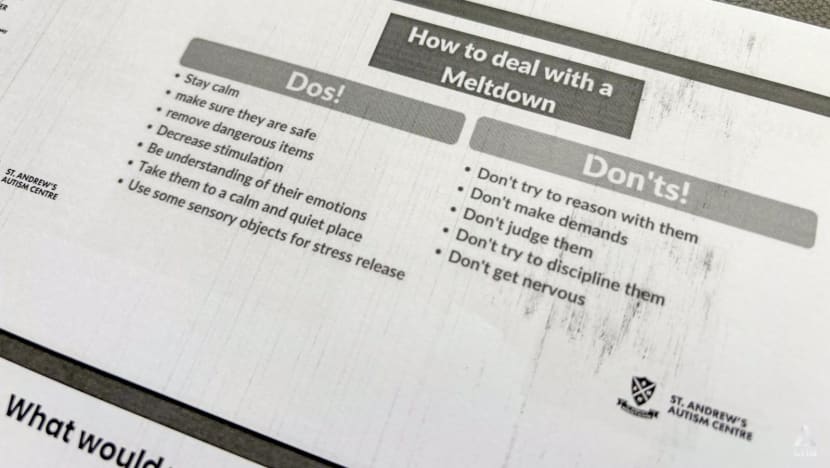
Uniqlo, meanwhile, has engaged SPD, a charity that supports people with physical, sensory and learning disabilities, to train their staff in disability awareness. To date, close to 80 staff have gone through the training session.
The Autism Resource Centre (ARC) said it has seen an increase in requests for autism awareness training from various organisations over the years, said principal autism consultant Alina Chua. These organisations include major attractions, community organisations and transport providers.
LOOKING BEYOND THE BOTTOM LINE?
Commendable as these efforts are, said Dino Trakakis, the founder of early intervention therapy provider Autism Recovery Network, he is worried that they will not take off.
“It’ll take just a couple of instances where things go wrong for them to stop,” said Trakakis. If a child throwing a tantrum happens to chase other customers away, businesses would be losing potential sales, he cited.
“Whether you have ‘quiet hour’ or ‘noisy hour’, the rent is still the same. … How much can they afford to lose?” he wondered.
Yamada said cost is “of course important for us to survive as a business here” but is “not much of a consideration” for the Uniqlo initiative as it is part of the company’s ‘Made for All’ brand concept and mission.
By thinking about the company’s values “rather than from a profit point of view”, Uniqlo can develop more initiatives that have the community in mind, said Uniqlo Singapore senior sustainability director Hwee Lee. “The profit is for us to give back to the community, right?”
On disruptions, she said: “It’s about bringing our customers on board this journey.
“An ultimate goal we have is that in our stores, our customers will be able to also embrace people with disabilities shopping alongside them. If they see someone needing help and being served by our staff, they could have a little bit of patience.”
Given its prior experience with customers with autism, EC House said they “aren’t as challenging to work with as one might assume”.
“The key is to communicate with their caregivers and inquire about how we can make the haircut process more comfortable for them,” said its spokesperson. “It often takes us more time to provide care, but our team is patient and compassionate.”
As for Frasers Property Singapore and why it has invested in its Inclusion Champions programme, CEO Soon Su Lin said shopping centres “are where people from all walks of lives meet and share experiences”.
“It’s therefore imperative for us to embrace and enhance inclusivity. … We believe that we can make a difference by facilitating a more supportive and caring environment at our malls.”
Besides people with autism, the company aims to also support people with dementia. Some shops as well as all customer service counters — totalling 29 points throughout 10 shopping centres — will serve as go-to points for the latter group.
REGULATION OR VOLUNTARY INITIATIVES?
Another concern Trakakis raised is that the provision of these services is patchy in Singapore.
“We need to understand (inclusiveness) as a society, not just … as one or two companies,” he said. “Then anywhere customers go, it’d be the same (treatment).”
CNA Insider checked with two other real estate groups, covering more than 20 shopping centres across the heartlands and the city, and neither have similar initiatives.
Trakakis suggested regulation, whereby there should be mandatory disability awareness training for companies, especially in the service industry. However, Ivan Tan from the SPD believes voluntary initiatives “work better” to create a more inclusive society.
“To influence retailers that can make that change and are willing to make that change — that’s even more impactful, even more powerful than forcing them by law,” said Tan, who is from the SPD’s assistive technology centre and leads a team providing training for corporates.
“(Companies should) do things because (they) want to make the space accessible. … When that happens, the change is real and is deep.”
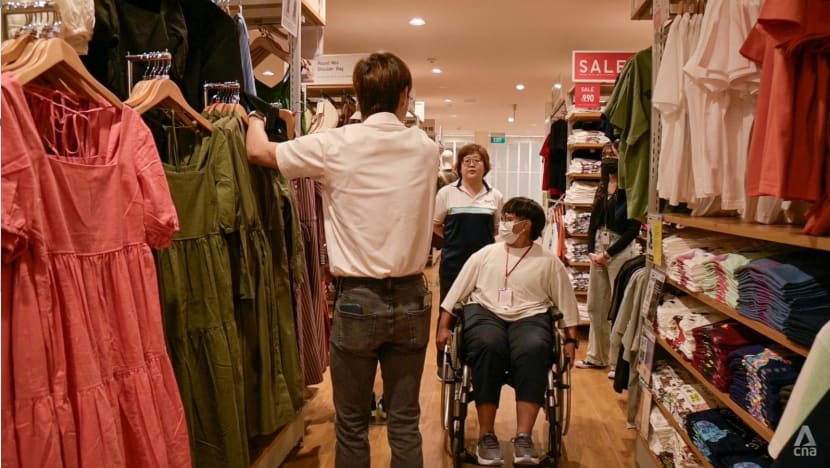
Retailers should also realise their bottom line loses out if they do not embrace inclusiveness, Tan said.
“There’s this whole untapped market of persons with disabilities, and possibly even their caregivers, who aren’t going to places because it isn’t comfortable,” he said, referring to disabilities beyond autism spectrum disorder.
“If you write that segment off, you’re writing off possibly 25 per cent of your pie.”
Showing “more success stories”, he thinks, will help in motivating businesses to make this investment of time and resources.
“We need to talk more,” he added. “(We must) be able to engage with retailers, organisations, to say that this … also will help their own staff, their own organisation be a lot more open and more empathetic to the community.”
TAKING IT TO THE NEXT LEVEL
Ultimately, what worries parents the most when they go out with their special needs children is that their children will be judged.
Rajendran recalled the stares his family would be greeted with whenever his son had a public meltdown. Then there could be remarks like, “You’re such a big boy — don’t even know how to behave in public?” or “Why do you want to (take) this kind of (person) out?”
But he and his wife learnt to take it in their stride. Their son is now 24 years old and can take the train on his own.
“We told ourselves we’d bring him up like a normal family (would). We’d just go out; we’d have the meltdown,” he said. “It’s important that my son has a (good) quality of life. And going out is part of that.”

For Christine, however, the prospect of going out fills her with “dread”.
Her 4-year-old has Williams syndrome, a rare genetic condition characterised by feeding problems, heart disease and developmental delay. She is sensitive to sudden loud noises — though the exact trigger can be random — and is non-verbal, said Christine.
The constant threat of a meltdown and the attention they get when it happens can be “very stressful”.
And the guilt keeps gnawing at Christine. The last time she and her husband took their three children — the oldest is 7 years old, the youngest is 1 year old — out for a leisure activity together was to the S.E.A. Aquarium last year.
These days, apart from having quick family meals, she sometimes takes her eldest child out separately.
Notwithstanding her reservation about the current timings, she hopes more shops could “openly announce” that they are more accepting of people with special needs.
“If … my child has a meltdown, I (wouldn’t) need to rush off. And I (wouldn’t) need to force her to just stop crying,” she said.
That’ll give us the courage as well … to go out more, to be able to try (these initiatives), … to, in a way, live a more normal life.”
What Trakakis hopes to see is a national campaign — like the war on diabetes — to raise public awareness of autism by, for example, explaining the way people with autism act and what is needed when a meltdown happens.
Understanding of autism in general is growing, said the ARC’s Chua. “As a society, we can now level up to the next step: how we respond to autism.
“We need greater acceptance of different ways of thinking, acting and communicating.”
And that is where businesses can play a part, said Tan. The larger effect of having more retailers welcoming people with autism would be greater empathy — a change in attitude from “I’m aware” to “I’m including them” — as more Singaporeans come into contact with persons with disability, he cited.








